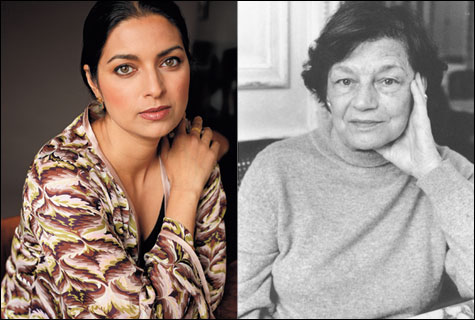
COLLECTIBLE One reason to get a lit mag is for pieces that won’t appear in book form — like Jhumpa Lahiri’s interview with Mavis Gallant. |
| Granta 106: New Fiction Special | Edited by Alex Clark | 256 pages $16.99 [paper] |
To sustain a literary magazine over decades it pays to have a gimmick. Since its inception over 50 years ago The Paris Review has interviewed at least one prominent writer in each issue. Locally, Ploughshares has a new editor and publishes at least 40 poets for each issue, giving many young poets their start. Hanging Loose — its 94th issue is just out — devotes a section to poets still in high school.Without a gimmick, few literary magazines survive. Agni, published by Boston University, is one. Of course most little magazines do not imagine long lives for themselves (and don't have university sponsorships) and some accomplish a great deal and then exit as if to warn that one can go on too long. Art & Literature (1964-1967) edited by John Ashbery, Anne Dunn, Rodrigo Moynihan, and Sonia Orwell — in my opinion the premiere little magazine in English of the second half of the 20th century — had a three-year run producing an even dozen issues that are today sought after by collectors and readers. Sought after because of features on painters Philip Guston, Lucien Freud, Jane Freilicher, and Alex Katz and on poet Frank O'Hara and then little known writers like Mary Butts and Adrian Stokes.
Granta, in its 30th year, has been for some years edited around themes. The new issue 106 is the "New Fiction Special." Issue 105 was "Lost and Found," and 104 had for its theme "Fathers." (Two superb autobiographical essays, a long one by the novelist Siri Hustvedt, and a page length "Portrait of My Father" by Jonathan Lethem, appeared in it.) What makes good editorial sense about this policy is that editors can contact writers with a specific request and can read the slush pile with equally specific intent. In short, they can do what editors should do: build a magazine and not pick and choose from what arrives in the mail.
The new Granta is not fiction 24-7. It begins with Fanny Howe's short poem "Seen." It is a vision of "a real bungalow" by the sea so clearly rendered that the reader is both transported and left longing to be there. Howe is a fine novelist less celebrated for her novels than her poetry and perhaps this is part of the point. The second introductory work is a short essay on the toys that got away in his life by another fine novelist, John Banville. Then the fiction begins, each work set off by a drawing that might as well be the story's cover. There is a two page "graphic piece" in color by Chris Ware and short stories by, among others, Ha Jin (Chinese immigrants in America), Amy Bloom (a divorce, a funeral, and a happy ending), Eleanor Catton ("Bad luck to have a woman on board," and we soon learn why), and Nicola Barker's epistolary story with footnotes. Each story is more than 20 pages long. Granta's departing editor Alex Clark means to give his readers more than a taste of each writer, a sort of "story-a-day" plan that makes a thick lit mag like this feel commodious, the pace leisurely.